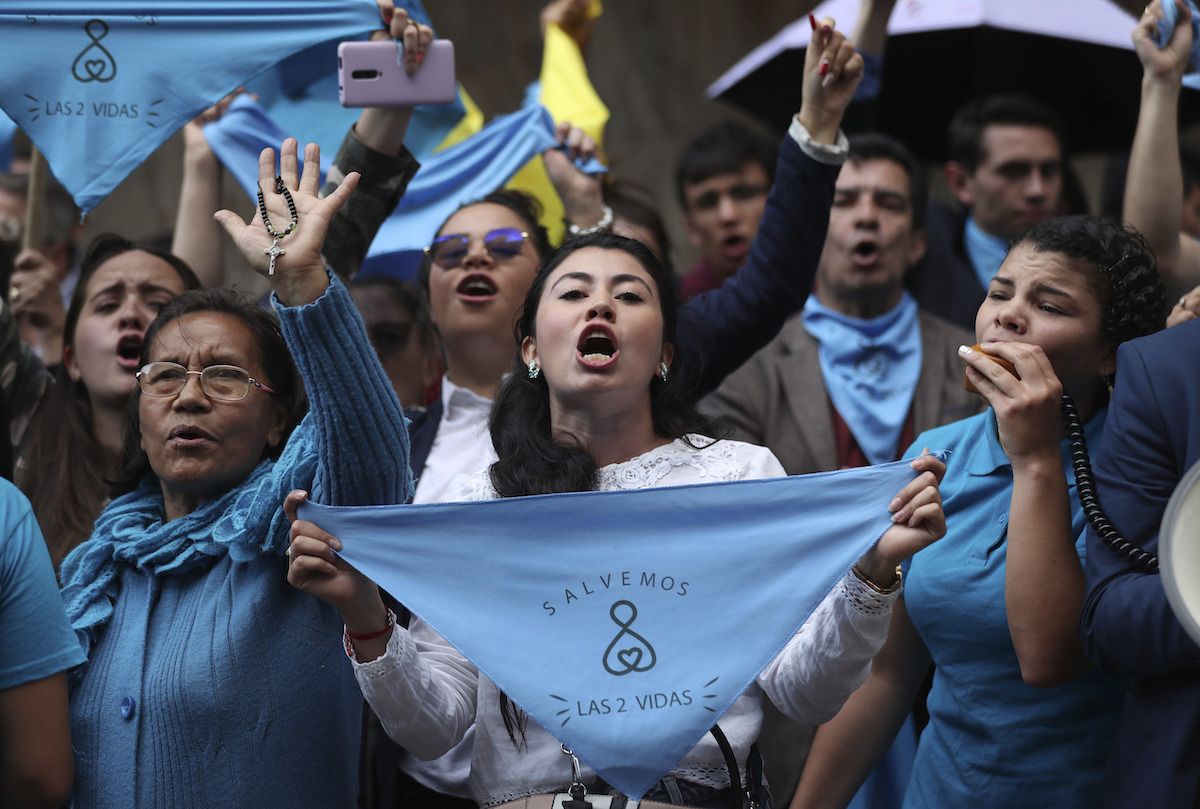

A pro-abortion activist protests in front of Colombia’s Constitutional Court in Bogotá, Colombia, Monday, March 2, 2020. Protesters gathered in front of Colombia’s Constitutional Court ahead of an expected ruling that could allow more women to access abortion if approved. (AP Photo/Fernando Vergara)
BOGOTÁ, Colombia (AP) — Colombia’s Constitutional Court voted Monday in favor of upholding the nation’s restrictive abortion law in a ruling that had been closely watched around Latin America.
Magistrates ruled to continue allowing the procedure only when medically necessary, quickly dashing the hopes of pro-choice advocates who thought the influential court might pave the way for a broader opening in a region with some of the world’s most restrictive abortion policies.
“They missed an opportunity to change women’s lives,” said Mariana Ardila, a lawyer with Women’s Link Worldwide, an international non-profit organization.
Magistrates held off on allowing women the right to legally terminate a pregnancy within the first 16 weeks of gestation, instead ratifying a 2006 ruling allowing abortions only when a women’s life is at risk, the fetus is malformed or the pregnancy is a result of rape.
Abortion is entirely prohibited in six nations in Latin America and has become a focal point of demonstrations in recent months.
In Colombia, a deeply Catholic nation, polls showed a majority would be against expanding access. Still, women’s rights advocates argued it was time for the court to reconsider its prior ruling, noting that many women in the nation still die seeking the procedure each year.


Anti-abortion activists protest in front of Colombia’s Constitutional Court in Bogotá, Colombia, Monday, March 2, 2020. (AP Photo/Fernando Vergara)
Colombia’s Constitutional Court is considered a referential institution in Latin America, and the decision could have had wide-reaching implications around the region.
The case was brought to the court by a lawyer, Natalia Bernal, who asked magistrates to outlaw abortion entirely. Instead, she sparked a debate within the Constitutional Court about whether abortion should be more broadly permitted.
Magistrates on Monday rejected Bernal’s plea, finding no reason to reconsider the 2006 ruling, but also refraining from a broader discussion on expanding abortion access.
“The plaintiff hasn’t submitted sufficient arguments to call into question a constitutional judgment,” they said in a statement read aloud in the court.
Ardila said the decision could nonetheless encourage other nations in Latin America to at least grant abortion access in certain cases, like when a woman’s life is at risk.
“It reaffirms that courts in Latin America should at least protect abortion for medical reasons,” she said.
Abortion rights are expected to become a hot topic again in Latin America this year, with Argentina’s president expected to send a bill to congress to legalize it. Women in the South American nation have been protesting as part of a larger wave of unrest aimed at shining a light on gender inequality.
Many nations in the region have high rates of maternal mortality that health professionals and women’s rights advocates say are linked in part to difficulty accessing abortions.


Pro-abortion activists protest in front of Colombia’s Constitutional Court in Bogotá, Colombia, Monday, March 2, 2020. (AP Photo/Fernando Vergara)
Illegal abortions under dangerous circumstances that led to fatal complications were once the number one cause of maternal deaths in Colombia. Today, with limited access, they represent the fourth highest cause, according to a coalition of women’s groups that was arguing in favor of expanding access.
Dozens of women, particularly those in rural areas, are still believed to die each year in Colombia after seeking abortions while thousands of others experience complications.
The polarizing nature of the issue was on display Monday outside the court, where about 200 protesters gathered, half in favor and half against. After the ruling, President Iván Duque, a conservative, praised magistrates for making “an important decision.”
“I’ve always said I’m pro-life,” he said. “I think that life starts at conception.”


